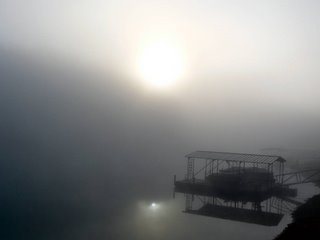Joe Haldeman and a dock in the mist
I read a book by Joe Haldeman over the weekend. The title is Old Twentieth referring to the 20th Century. Haldeman writes science fiction and he's most well known for the excellent book The Forever War which was his highly fictionalized reflection on the war in Vietnam and his part in it. He won the Huge and Nebula awards for that novel. The two most prestigious awards in the SF genre.
This book isn't bad, but I'm glad I picked it up from a remainders table. For $7 it's fine, but I'd not say it's worth the list price of $24.95. In a limited way it reminds me of The Expected One, a book by Kathleen McGowan that I read last week. In both these books there's a thread running through them that is supposed to be the "extra material" but ends up being more interesting than the main plot. In McGowan's book it's the excerpts from Mary Magdalene's diary, in Old Twentieth it's the summaries of different years of the 20th century and some of the more subtle happenings in those years.
Supposedly what's happening in the book is that a vaccine has been found to prevent aging and that set off a war to, wait for it, a war to end all wars. Sure, it's a familiar tune but in this case over 95% of the human population is wiped out so the human landscape is quite different afterwards. But that's just the backdrop of the book. The main context is that a number of these now immortal humans decide to colonize a planet around a near star. Since they have to go slower than the speed of light, it'll take a thousand years to get there--and some problems arise. This book is about the main problem--and the title refers to the pastime of the human colonists of using a "time machine". Of course they can't actually travel in time but the machine allows them to think they're in a different time while it monitors their body and brain functions.
Essentially this novel seems to be an excuse for Haldeman to explore some of the back currents of history but in a fictional and thus more marketable fashion. It's definitely readable and if you like science fiction and history I'd say it's well worth taking out from the library. I'd only buy it if you're a dyed in the wool Haldeman fan.
Here's two pictures I took within a minute of one another. One uses a "border" of a small tree and some shoreline to frame the dock and the other just has the dock floating, if you will, in the mist. Which do you like better?


This book isn't bad, but I'm glad I picked it up from a remainders table. For $7 it's fine, but I'd not say it's worth the list price of $24.95. In a limited way it reminds me of The Expected One, a book by Kathleen McGowan that I read last week. In both these books there's a thread running through them that is supposed to be the "extra material" but ends up being more interesting than the main plot. In McGowan's book it's the excerpts from Mary Magdalene's diary, in Old Twentieth it's the summaries of different years of the 20th century and some of the more subtle happenings in those years.
Supposedly what's happening in the book is that a vaccine has been found to prevent aging and that set off a war to, wait for it, a war to end all wars. Sure, it's a familiar tune but in this case over 95% of the human population is wiped out so the human landscape is quite different afterwards. But that's just the backdrop of the book. The main context is that a number of these now immortal humans decide to colonize a planet around a near star. Since they have to go slower than the speed of light, it'll take a thousand years to get there--and some problems arise. This book is about the main problem--and the title refers to the pastime of the human colonists of using a "time machine". Of course they can't actually travel in time but the machine allows them to think they're in a different time while it monitors their body and brain functions.
Essentially this novel seems to be an excuse for Haldeman to explore some of the back currents of history but in a fictional and thus more marketable fashion. It's definitely readable and if you like science fiction and history I'd say it's well worth taking out from the library. I'd only buy it if you're a dyed in the wool Haldeman fan.
Here's two pictures I took within a minute of one another. One uses a "border" of a small tree and some shoreline to frame the dock and the other just has the dock floating, if you will, in the mist. Which do you like better?



Comments
Sign me up for your next photography lesson.
I love the pictures they're great!
here via michele... and happy t-day, Dave! I think I'll buy your SIM some new clothes for the occasion...
You read a lot and quickly don't you?
Happy Thanksgiving!
Have a good Thanksgiving. We missed you at lunch today.
I have again studied both pictures. I think I know what pulls at you about the second one. It's the reflection of the sun. The sunlight is diffused by the mist, but the reflection in the water has a smaller, more pinpoint look.... it pulls you in to it.
Or maybe not. Having turkey tomorrow?
Here via Michele again Utenzi...
Hi, Michele sent me :-)
I'm on a strict diet of non-fiction right now and enjoying some really good writing.
Enjoy your holiday tomorrow.
p
here via michele today
Happy Turkey Day, if you're not Canadian.
And $25 is ridiculous. Books are so freaking expensive these days.
Happy Thanksgiving and hello from Michele's!
Regardless, you manage to avoid the typical foggy-image cliche through your unique approach to composition. I could look at your images of nature all day. For days on end.
Visiting from Michele's, but I hardly need additional incentive to drop by.
Happy Thanksgiving!
I like the first picture better just because I am a down-to-earth person, I need a floor, something stable to rely on...
Both pictures have a special charm, though.
Happy Thanksgiving!
Here via Michele's :)